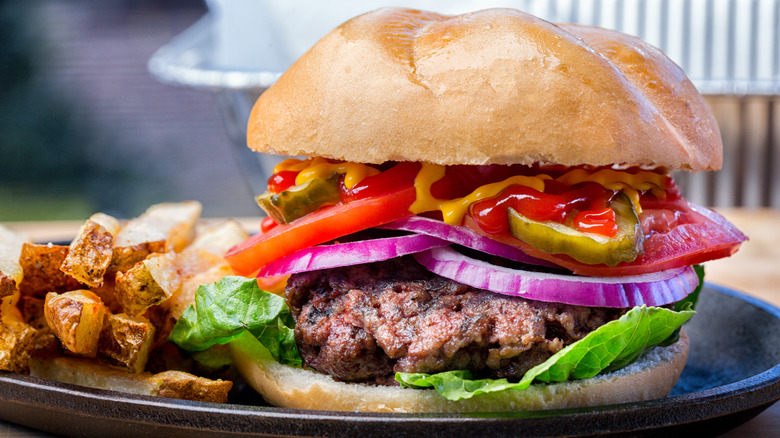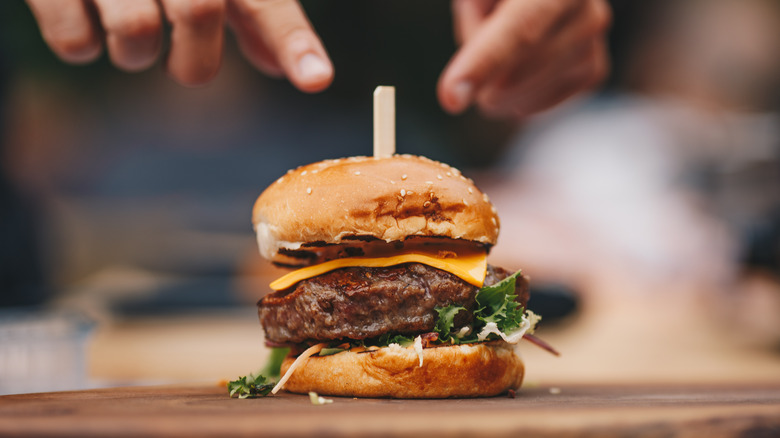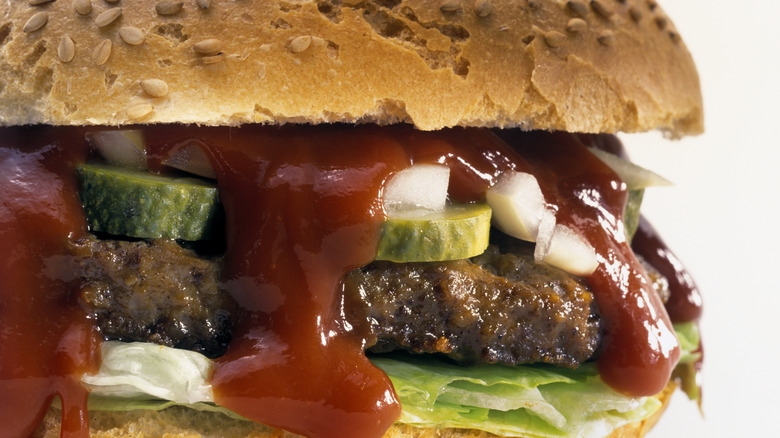Why Some Chefs Say To Skip The Ketchup On Your Burgers
The classic American cheeseburger is typically topped with lettuce, tomato, onions, mustard, and ketchup. Ketchup and mustard, along with mayonnaise, are the go-to burger condiments for many people. If you're not a burger aficionado, you may find it strange to learn that putting ketchup on a burger is a controversial choice for many people. Though it's not an unusual topping for a burger, some culinary experts, including chefs, advise against putting ketchup on burgers.
Critics point out that the overall sweetness of ketchup doesn't support the savoriness of beef. While contrast does add depth to the dish, they argue that tomatoes by themselves already do an admirable job of lifting a burger's flavors. Add ketchup into the mix, and you swing the pendulum too far into the other direction for their liking.
In an interview with Grub Street, Chef George Motz advised against putting ketchup on your burger, calling it "one of the biggest burger faux pas." Motz argued that ketchup doesn't work well to support beef, and while it may seem like ketchup was always part of a classic burger, the original recipes didn't include the condiment. "It was introduced by some of the fast-food chains in the '50s to get kids interested in eating burgers," he said. "The original American hamburger only came with a few basic elements: mustard and pickles — and if you wanted onions, you got onions."
Some burger restaurants don't serve ketchup
It's not just chefs like George Motz and a select few rallying against ketchup on burgers. If you visit certain parts of the country, you'll find that they prefer their beef with as little of the tomato-based condiment as possible. According to the Houston Press, no ketchup on burgers is a hard rule in Texas and Oklahoma, with both states largely preferring only mustard or mayonnaise for their burgers. In fact, if you order a burger with ketchup in those states, they might refer to it as a "Yankee burger."
If you search throughout the United States, you'll come across individual restaurants that have banned ketchup. Take Mad Fresh Bistro in Fort Myers, Florida, which doesn't offer ketchup as an option. Chef Xavier Duclos told ABC News that he doesn't believe in altering his recipes. He said, "It's not so much a refusal to serve ketchup, but I don't serve ketchup because I don't have to. It's just sweet!" It's not just a Southern thing, either. Louis' Lunch in New Haven, Connecticut, which is recognized as the birthplace of hamburgers, is strict about not offering ketchup for its burgers, and it strongly discourages any requests for ketchup with a sign hung up on the wall. The restaurant's owner, Jeff Lassen, told Serious Eats that ketchup is banned for this reason: "We want you to taste the meat."
Support for ketchup on burgers
If you enjoy ketchup, does that mean you've been eating your burger wrong all this time? The great thing about burgers is that they are endlessly customizable, and even our best burger recipe calls for a healthy heaping of ketchup to serve. While there are critics of ketchup on burgers, there are also those who support the combination as well, and given the popularity of the condiment, you're likely not alone. Supporters of ketchup point out that the sweetness of the condiment is the point. It helps contrast against the savoriness of the beef and onions, and blends well with the tartness of mustard and pickles.
In fact, supporters love ketchup for its ability to blend all the disparaging elements of a burger together. Mustard alone may be too dominant and may overwhelm the other ingredients, even when mixed with mayonnaise as a mellowing agent. Likewise, when ketchup is eaten with both burger and fries, it helps tie together the whole dish in a nice culinary bow. Ketchup supporters can also count chefs like Bobby Flay firmly in their corner. When describing the ingredients list for his ultimate burger to TODAY Food, ketchup certainly made the cut, along with the simplicity of other ingredients that make up the all-American classic recipe.


